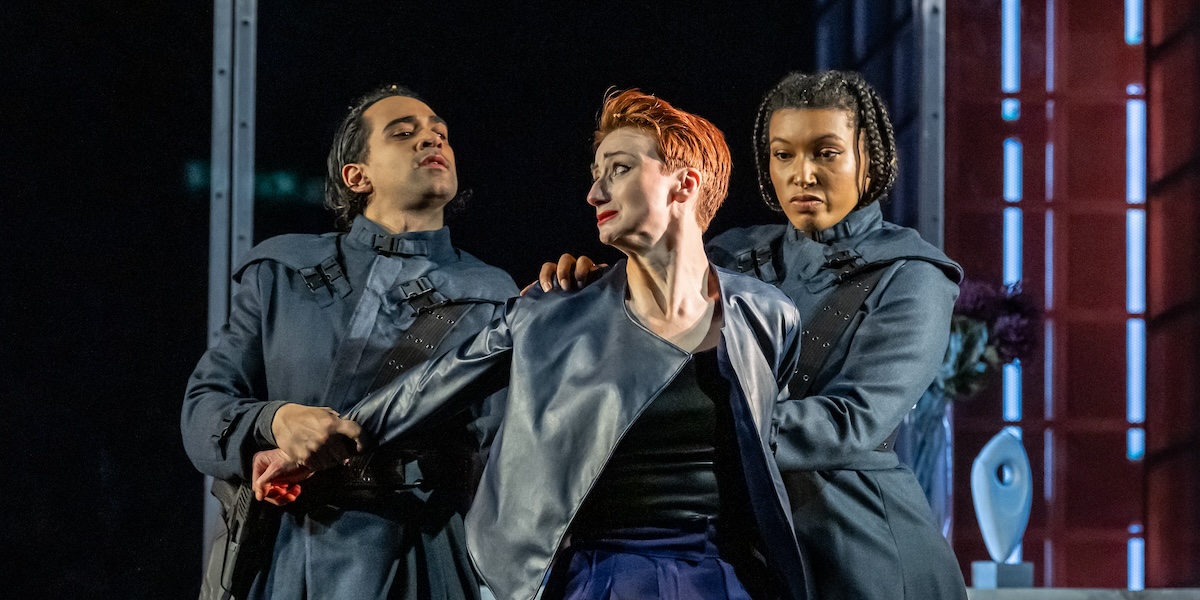'Minority Report' review – this sci-fi adaptation about futuristic crime-fighting has visuals to kill for
Read our review of thriller Minority Report, starring Jodie McNee, now in performances at Lyric Hammersmith to 18 May.
Talk about burying the lede: midway through the glisteningly tech-savvy if problematic Minority Report, set in the 2050s, we’re informed that the dismantling of the NHS has brought down the British government.
Now there, you might think, is an intriguing topic for a play. Instead, the Tony-nominated director Max Webster (Life of Pi) and author David Haig, himself an Olivier Award-winning actor, have conjoined forces to attempt a stage version of the same Philip K Dick story that spawned the 2002 Steven Spielberg/Tom Cruise movie.
So what if Haig’s previous forays into playwriting have been set in the past? Artists – like Minority Report itself – have every right to look forward. And the finished product, running a full hour shorter than the movie, has visual élan to spare, courtesy an ace team of creatives that includes Jon Bausor, whose stage adaptation of Spirited Away hits the West End next week.
Reminiscent of the sort of monochromatic visual sheen one associates onscreen with Ridley Scott, the set suggests an outsized cage that threatens to make captives of us all, and finds room for an onstage taxi and many a vertiginous perch to confront our imperilled heroine.
She is Dame Julia Anderton, a gender-flipped version of Tom Cruise’s John of the film, played by a hard-working Jodie McNee. A brainiac neuroscientist who references Hamlet the moment she steps into view, Julia is a “pre-crime” expert who finds herself unwittingly fingered.
At the forefront of technology enabling malefactors to be caught prior to going in for the kill, Julia doesn’t expect to be named as a murderer-in-waiting herself. Cue a race against time, and technology, on the way to a final encomium on behalf of the brain, and its capacity to paint the Mona Lisa on the one hand and land people on Mars on the other.

On the run amidst an ostensibly peaceable landscape (no need to lock your doors: imagine!), Julia surrenders to suspicion and mistrust and a distaste for the very chips that have been implanted in the citizenry; those, it seems, were voted in by a people’s referendum, and we know how that style of democracy can play out.
One of identical twins, Julia has lost her beloved sister prior to the start of the play, which ought to lend rather more emotional ballast than it does. Suffice to say that she is forced to reassess almost everyone in her circle, from her husband through to a Home Office minister who paid for her final year of studies some years before.
It’s giving little away to report that the resident baddie is evident from the off, whilst Haig’s script attempts to locate what humour it can among the lexicon of an algorithm-heavy AI world: Siri/Alexa get the inevitable nod, alongside the obsolescence of Apple watches though not, apparently, of Coronavirus, whose epsilon variant has remained even where the NHS has not.
Resembling a younger Lesley Manville, McNee has drive and determination to spare, even if one rarely warms to her or her plight, and Tanvi Virmani’s AI aide-de-camp, David, morphs impressively from a visual projection to actual person and back again. The show’s look as it stands now is its lucky charm, even if the majority report, I have a hunch, will focus on a script in need of a reboot.
Minority Report is at Lyric Hammersmith through 18 May. Book Minority Report tickets on London Theatre.
Photo credit: Minority Report (Photos by Marc Brenner)
Originally published on

